NEWSPAPERS Special Edition





















GREENWAY CORRIDOR RUNS BETWEEN FARMINGTON HILLS AND HAZEL PARK
BY MIKE KOURY mkoury@candgnews.com
OAKLAND COUNTY — The Southeast Michigan Council of Governments recently announced it was awarding more than $10 million in Transportation Alternatives Program grants.
SEMCOG awarded $10,707,004 to cover 10 projects in southeast Michigan, including one in the city of Southfield.
Southfield will receive $1,094,801 for its project which, according to a press release, is a SEMCOG-identified regional bicycle and pedestrian corridor almost a mile in length on Nine Mile Road.
“SEMCOG’s Transportation Alternatives Program (TAP) — one of our most impactful programs — enables us to provide direct funding into communities to improve safety for all road users, connect our regional trails and greenways, and improve access to key destinations like schools, parks, and jobs,” SEMCOG Executive Director Amy O’Leary said in a prepared statement. “These ten projects show both the need our region has for high-quality, well-maintained walking and biking infrastructure as well as the commitment our communities have to ensuring quality of life for residents and visitors.”
See CORRIDOR on page 9A
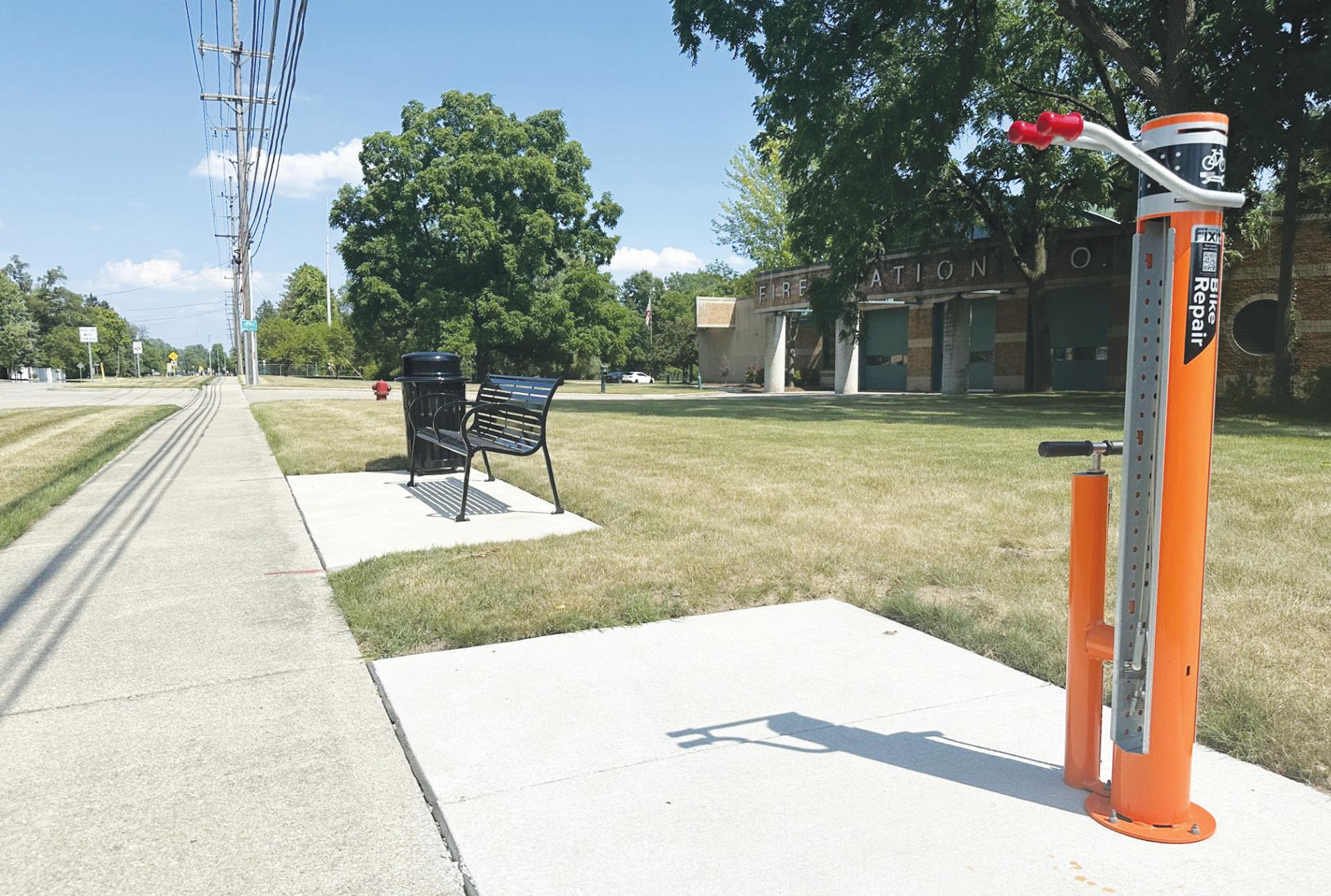
BY ANDY KOZLOWSKI akozlowski@candgnews.com
MADISON HEIGHTS — As shopping bills rise, the Madison Heights Food Pantry has been a lifeline for many trying to make ends meet. But the pantry’s ability to provide relief depends on the good will of those able to donate time and supplies.
“The pantry fulfills a very important need in our community,” said Madison Heights Mayor Pro Tem Mark Bliss. “I’d say to anyone who needs help, be sure you visit the pantry. And to anyone who can help, please donate and volunteer, so the pantry can continue to serve our community.”
The pantry continues to distribute boxes of food from 10:30 a.m. to noon on the first and third Saturdays of each month, operating out of borrowed space at Central Church, located at 1529 12 Mile Road in Madison Heights. Distribution is done curbside, with many lining up early for a wait that can take one or two hours. Most stay in their cars while volunteers load up their vehicles. Others walk in with carts, where staff members try to accommodate them.
Distributions in recent months have continued to average about 130 families. The pantry first opened in the spring of 2020 in response to the COVID-19 pandemic
and business shutdown. There are no eligibility requirements — all someone needs to do is provide their name, phone number and the number of family members.
The boxes contain all sorts of food: cereal, bread, beans, fresh fruits and vegetables, packaged or canned meat, and a dessert. There are also sometimes recipes for nutritious meals, and when someone has pets to feed, the pantry tries to provide those items, too.
“The Madison Heights Food Pantry is one of the most inspiring examples of community-driven support in our city,” said Madison Heights Mayor Roslyn Grafstein, in an email. “It is entirely volunteer run — not a



























































BY GENA JOHNSON gjohnson@candgnews.com
OAKLAND COUNTY — Summer is in full swing, and people are enjoying Oakland County’s many beautiful lakes and waterways.
After a tragic drowning on Cass Lake in Keego Harbor, Oakland County Sheriff Michael Bouchard shared watercraft and water safety tips.
“If you are not a strong swimmer — or even if you are — it’s not a bad idea to wear a flotation device,” Bouchard said.
People can drown in mere inches of water, depending on the circumstances, and find themselves in distress very quickly, the sheriff said.
“Unlike the movies or TV, where you see somebody off in the water (screaming), ‘Help, help, help,’ and there’s time to react and maybe even get to them — that’s not the way it happens,” Bouchard said. “People get into distress very quickly, and slip under the water very quickly, oftentimes without people even seeing them.”
Do not use alcohol or other mind- or body-altering substances while operating a boat or jumping in the water from a boat, he said.
“We (the Oakland County Sheriff’s Office) have seen people who have been drinking quite a bit, (and) they’re not driving the boat, so it’s legally OK for them to do that,” Bouchard said. “(But) they don’t realize the magnification of the physiological effects of being in a very hot sun, drinking alcohol, and the body is in a dehydrated state. It can diminish your physical ability to swim or respond to an emergency.”
Other tips from the sheriff include doing a preseason check to make sure all equipment on the boat is operating properly and then checking again each time before setting sail.
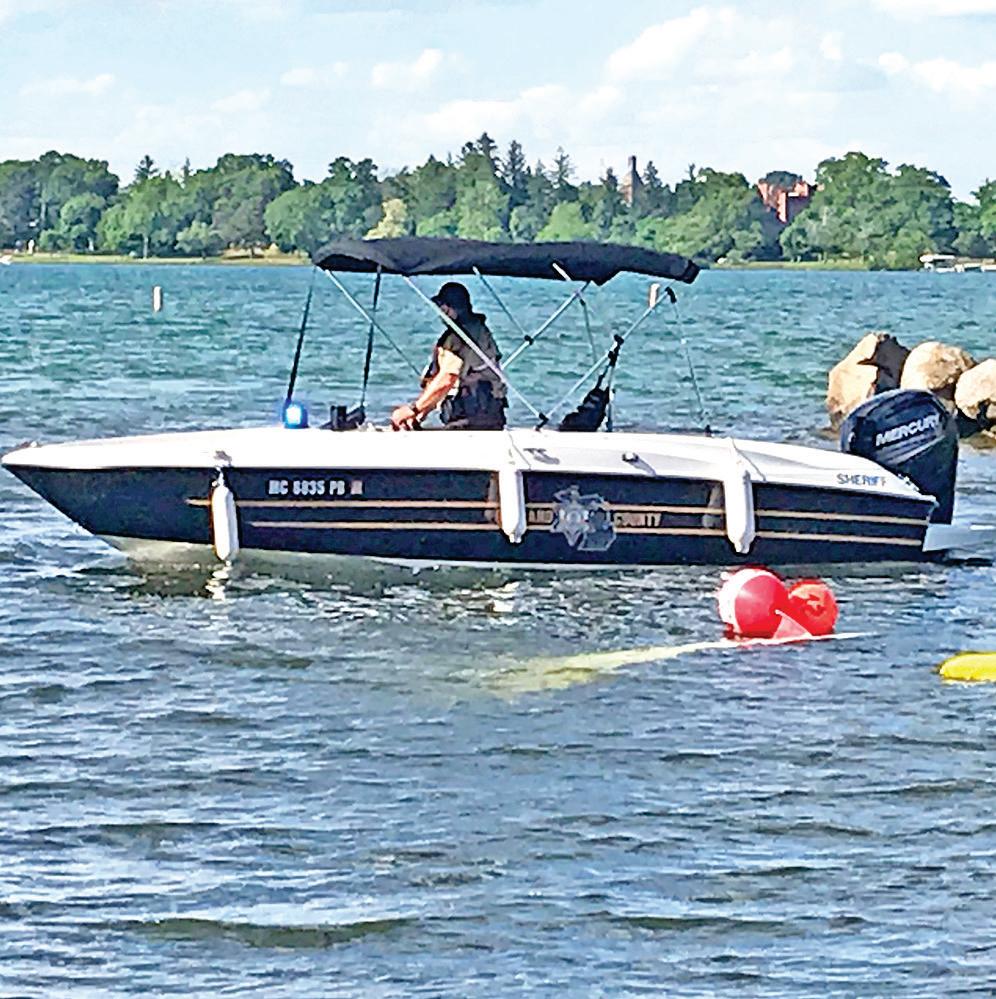
BY SCOTT BENTLEY sbentley@candgnews.com
DETROIT — Detroit City Football Club has grown from an idea between friends to an established professional sports team in Detroit at a rapid pace.
The club has not only found extreme success on the field, but is impacting the community off the field. DCFC continues to grow, and the team’s story resonates with Detroiters in the best possible way.
“The best thing DCFC has going for it is the people,” DCFC co-owner and Chief Creative Officer Alex Wright said. “It’s folks that are passionate for soccer but also really dedicated to not only growing the game, but making the community a better place.”
One of the many unique traits that DCFC has is the path to becoming a professional team. In most major sports, Detroit teams were a part of the league’s inception, or joined as an established professional team. DCFC began as a summer league team and

has worked its way up the American soccer ranks to become professional.
“It’s been less than 15 years since the five of us got together over some beers and kicked in a few thousand dollars and created a men’s summer league team.” Wright said.
“It’s really hard to be the fifth pro team in
any city … and we don’t take that for granted. It’s the privilege of being the fifth team.”
The success that DCFC has seen is something many other soccer teams in the area have attempted to create over the years. This club has integrated itself into the community in a way that few other teams in the
state can match.
“We’ve tapped into the unique things that soccer does that other sports can’t in this community. … The U6 boys and girls that take to the pitch, across our state now, are wearing the exact same jerseys as our professional team does,” Wright said. “That’s an incredible strength of our organization, the fact that you can be a part of the club and never really grow out of it.”
The club is an example of getting back what is put into something. The ownership group has invested heavily into the community, and the community has responded by showing out for DCFC.
“Those of us who founded the club, and those of us who are leaders in the organization, we’re not really up in some ivory tower looking down on the game,” Wright said. “We are the ones on the sidelines. We were the ones when this first started that were mowing the lawn and selling the tickets. … There’s accountability baked into so much of what we do.”
DCFC is also a beacon of hope in terms
BY CHARITY MEIER cmeier@candgnews.com
METRO DETROIT — The United States of America is the melting pot of people and cultures: a nation built on the dreams of people who came here from around the world, often to escape persecution.
Three business owners in C & G’s coverage area recently took the time to share their stories of how they found their dream through hard work, determination, and dedication in America.
‘If you apply yourself, you can make it’
Johnette Eggert, owner of Elite Bridal and Donate a Gown USA Int’l in Farmington Hills, came to the U.S. 30 years ago to escape the civil war in her native Liberia.
“I think it was the best decision they made for me,” Eggert said of her parents’ decision to bring her to the U.S.
She said she knows Africa and recalled seeing people get lined up and slaughtered in Liberia. She said people from Africa would be grateful just to be here in the U.S. and to have the chance to obtain their dreams.
“It’s America, and the whole world fits in America. America is a big enough light. You go to Liberia, and people would give anything in the world to come here. Even if they’re sleeping on the street, they know that they can go to the church and get food. You can go and get a job. If you apply yourself, you can make it,” Eggert said.
She said entrepreneurship runs in her blood. Her parents founded the Richard M. Nixon Academy in 1965, a private school in Liberia for children in kindergarten through 12th grade. Eggert said she believes education is the key to success for anyone. She also strives to help provide food to the community by donating to Cares in Farmington Hills.
Through the bridal shop, Eggert said she hopes to help local youth continue their education by providing scholarships. She also wants to support the schools her parents started in Liberia, where a teacher makes $25 and a principal, $75.
It was her father’s kindness and generosity to those less fortunate that ultimately spared his life in Liberia. Eggert’s father, John Woolu, worked for the Liberian government and was on a hit list. However, the hitman who was assigned to assassinate her father recognized him and recalled how he had fed him as a young boy, when his family was homeless. So instead of killing him, he took her parents to the border, where they were able to return to the U.S.
Eggert said the business was a dream of hers after working as a substitute teacher in Madison Heights for many years and hearing girls repeatedly say how they wished there was an affordable store where they could shop for high-end dresses.
“I had a dream and for months and months, I kept thinking about the dream, and I kept thinking about the

Training Techniques
We rely on the latest science-based training techniques and modern tools to create a personalized training program tailored to you pets unique personality and behavioral needs.
Experience
Family-owned and operated, with over 50 years of combined experience under the leadership of head trainer Jim Blau.
Training Frequency
Dogs in our program receive 8-12 personalized training sessions per day with compassionate, well-trained staff.
Kennel Size & Comfort
Our kennels are spacious and on average twice the size of other training facilities. We also have kennels to fit all breeds and sizes of dogs, assuring maximum comfort for your furry friend, from the itty bitty pups to the great big ones! Did we mention our kennels are climatecontrolled?

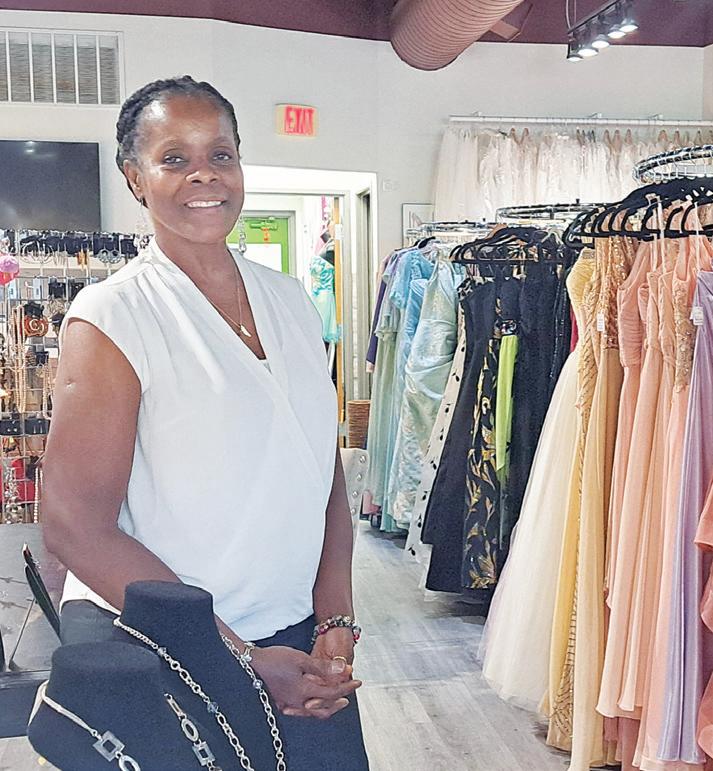
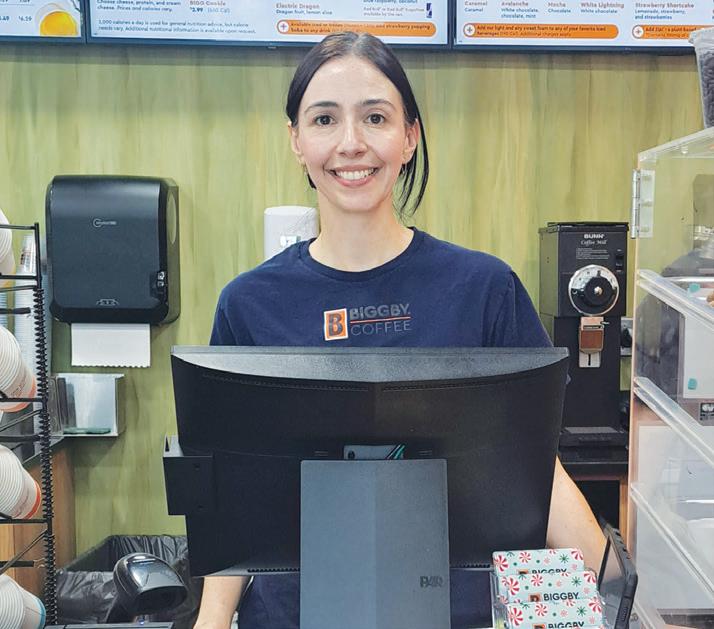

We use only pet-safe products effective against kennel-borne illness like Kennel Cough, E. Coli, Staph, & Parvo
Therapeutic Enhancements
Each kennel is outfitted with near-infrared light to reduce inflammation, improve skin health, and lower anxiety.
Calming Environment
We play calming music in the 40 megahertz range-scientifically shown to ease anxiety in both dogs and humans.

Holistic Wellness
We partner with a local CBD/CBN distributor to provide natural, holistic options that help reduce anxiety.






came to the U.S. from Liberia 30 years ago. She said owning a business was a dream of hers after working as a substitute teacher in Madison Heights and hearing girls say how they wished there was an affordable store where they could shop for highend dresses.
she and her
decided to look into franchising their own Biggby Coffee business after the birth of their second child. Since coffee is such an important part of Brazilian culture, they thought it was the perfect type of business to get involved in.
customers.
Whatever your style — let Home, Door & Window Products bring your design ideas to life. With unequaled service and superior selection. Keep the big guys honest... Call us today for a FREE in home estimate.













vision, and what I would hear the students say about how they wished they had a place that was fancy and had a set up that wasn’t like a thrift store, but still be getting a resale item that was high end, and I was like, ‘I can do that.’ And here it is,” she said.
‘The feeling of brightness and happiness was the first feeling I had’
Jenny Wu, who owns three Chinese restaurants, came to the U.S. as a child in 1981 to escape political turmoil in her native China. Her family was labeled as traitors to the country by the Communist Party.
“There was a lot of changes. I noticed the streets were brighter. The streetlights just made it seem like America was really beautiful,” Wu said of her initial impression of America. “Back in the day in China wasn’t like how it is now. They didn’t allow people to have lights or have anything really. The streets were always dark at night. So that alone, just entering into the United States, the feeling of brightness and happiness was the first feeling I had.”
She said initially, a language barrier caused her family to struggle with employment for a while. She said they only came to the U.S. with approximately $30 and two suitcases. Eventually, her mom started one of the restaurants Wu owns with a friend in order to help her godson get a green card. However, her mom, a pianist, did not really care for the stress of the restaurant business, and her mom’s godson didn’t care for it, either. So Wu, who had gone to school at the University of Michigan for organizational studies, which incorporates business with psychology, ultimately took over the business and expanded it. At one point, she owned four restaurants across metro Detroit: JJ Crab House and Lucky Kitchen, in Ann Arbor; Sapporo Hibachi Steakhouse and Sushi, in Livonia; and her largest one, Wasabi Japanese Steakhouse, in Novi. After 13 years in Novi, she closed the restaurant this year but still maintains her other locations.
Wu said she has faced some challenges as an immigrant business owner over the years, especially when there was the SARS epidemic, which originated from Hong Kong.
“SARS was a big challenge for me. A lot of people didn’t want to come eat Chinese food,” said Wu. “Also, back in 1993 when I started it, a lot of people saw Chinese food as really unhealthy. So yeah, there’s always challenges.”
‘This is something that, at one point, my kids can be
part of it’
Mariana Steganha co-owns the Biggby Coffee franchise location in Lathrup Village with her husband, Rodrigo.
Originally from Brazil, she came to the U.S. with her husband, who had a temporary work assignment in 2016. She said he was offered a full-time position with his company in the U.S., and ultimately, they ended up staying stateside.
Steganha said that after the birth of her second child, they decided that a traditional 9-5 job was not something that was suitable for her anymore. They decided to look into franchising their own business. Steganha said their neighbor is the area representative for Biggby franchise locations and asked if they were interested in opening one. Since coffee is such an important part of Brazilian culture, they thought it was the perfect type of business to get involved in.
“My husband thought it was a good idea to own a business and long term, we would have more time for our family, too,” Steganha said. “This is something that, at one point, my kids can be part of it.”
They opened the franchise in November 2024. She said she really has enjoyed getting to know the community through the business.
Like Wu, Steganha said that the biggest challenge she had when coming to the country was the language barrier. She said her husband spoke the language well, but she didn’t. She did, however, have a foundational understanding of the written language and was able to learn it by submersion with her first job in the U.S.
“I got to learn how to communicate. I had to face challenges like talking to people over the phone, especially angry customers, with some delayed orders, for example. So you know customer service, so I was the first one to take the heat,” she said. “So that brought me a lot of experience. For me, when I’m here at the cashier talking to people, that’s something that I really appreciate because it’s how everything started for me when I started my career path.
“I like that, and people get curious and say, ‘Hey, where are you from? I noticed your accent,’ and we start to get to know each other,” Steganha said.
She said getting to know the community and her staff is her favorite part of owning the coffee shop. She said she has learned a lot from both her customers and her staff.
Wu has been in the restaurant industry for years and said that her Novi customers have continued to frequent her Livonia locations. Eggert and Steganha, who recently opened their businesses, said that they just want people to know they exist.

























































BY CHARITY MEIER cmeier@candgnews.com
NOVI — Grammy-nominated artist Gaura Mani is scheduled to perform at the 40th annual Festival of Chariots in Novi on July 20.
The festival will be held from 11 a.m. to 5 p.m. on July 20 at the Novi Civic Center, 45175 W. 10 Mile Road, and nearby Fuerst Park. There is no cost to attend.
Mani is an internationally recognized American-born Kirtan singer and motivational teacher, with ties to Detroit. She was born in Chicago but spent her early childhood years living in Detroit, according to her friend and festival spokesperson Neha Patel. Mani is known for her chanting songs, including “Radharani Ke Charan Pyare Pyare,” “Shri Radha Kripa Kataksh,” and “Aaj Biraj Mein Hori Re” featuring Kumari Radhe.
“She will be singing and the chanting will follow her singing,” said festival spokesman Madhu Mahadevan. “It’s like a meditation mantra, just chant and then repeat, but she definitely puts a lot of beat into it, so it’s really fun.”
Patel said that Mani, who now resides in India, performs at various Festival of Chariots events across the country, and internationally, every year. She said that Mani has come to the Detroit festival a few times over the years, most recently circa 2021. According to Patel, Mani has a special place in her heart for the city, and whenever she is in town, she will perform at the Festival of Chariots in Novi.
“She is always someone that we look

forward to having at our festival, because she has a beautiful voice and it’s just she knows how to light up the whole festival and so forth,” Patel said.
“We’re very fortunate to have her come to Detroit and sing in the parade as well as sing on one of our entertainment stages,” she said. “We’re very excited to have her.”
Patel said Mani’s entire family is gifted and often performs with her. She said that

some people come to the festival just to see Mani and her family perform.
Mani will be performing during the parade procession and again at 2:30 p.m. on the live music stage.
The annual festival celebrates happiness as the Hindu deities of Lord Jagannath, Balarama and Subhadra are paraded down the streets of the city in a 40-foot chariot that is pulled by worshippers and other festival attendees.
“You will definitely want to pull the rope, because when you pull the rope, you’re pulling the supreme lord,” Mahadevan said.”That’s very, very powerful to pull the rope. You’ll feel it in your whole body if you do it.”
The festival will begin at 11 a.m. with speeches by representatives from the ISKON Temple in Detroit, Mayor Justin Fischer and other dignitaries outside the Novi Civic Center.
“Novi’s always proud to have the Festival of Chariots and partner with them. It’s such a wonderful event and fits right in with our willingness and wantingness to showcase all the different cultures that we have in Novi,” Fischer said. “And the message that they spread of peace and love is one we embrace as well.”
The chariot is expected to be pulled from the Civic Center down 10 Mile Road to Taft Road and on to Fuerst Park, where a helicopter will drop rose petals over the audience and the chariot.
At the park, there will be two stages this year, as organizers had a surplus of people and groups wanting to perform. One stage

will feature short plays and dances, while the other stage will offer live music. The short plays will be 10- to 15-minute dramatic plays, including one telling the history of the festival.
There will also be approximately 20 vendors offering traditional Hindu and Indian clothing, jewelry, henna tattoos, and more on hand, along with food vendors, yoga and children’s activities. The temple will also be offering a complimentary sanctified meal.
According to Mahadevan, the festival has continued to grow bigger and bigger over the years. Last year, he said, the festival hit approximately 15,000 attendees as measured by the number of complimentary food plates that were given out.
“So, we’re excited that the festival is growing,” Mahadevan said. “We feel really good that word is getting out about our festival and people like to come. We’re seeing people come over and over again.”
He said they have several smaller festivals in communities all around southeast Michigan, including Farmington and Canton, but Novi is the largest festival.
“You can definitely say this is the biggest one in Michigan, and the longest-running one as well. This is our 40th year,” said Mahadevan.
“We’re looking forward to having many people there just to share in the joy of the festival,” Patel said.
“We’re not going anywhere. It’s obviously been very well received by the people of Novi and in Detroit. It’s a very, very powerful festival,” Mahadevan said.

of growing the game of soccer in the Detroit area.
“The additional responsibility that we take very seriously is growing the game within our city,” Wright said. “We are consciously doing a ton of work in the Black community and in the Hispanic community to grow the game. … We’re doing everything we can to make sure that we are growing a team that is accessible to everyone and that looks like our community.”
One of the biggest projects to make the game more accessible to everyone is a new stadium for the club that’s expected to be ready by the start of the 2027 season. The pitch will be at the corner of Michigan Avenue and 20th Street, where the former Southwest Detroit Hospital is located.
“The community is buzzing about the thought of a soccer-specific stadium downtown, bridging Corktown and southwest Detroit,” Wright said. “It’s not just folks that love soccer, it’s folks that love Detroit and understand how perfect that location is. … It’s an incredible progression going from a high school field at Cass Tech (to the new stadium).”
DCFC has played at Keyworth Stadium in Hamtramck since 2016. The club raised money to renovate Keyworth almost a decade ago and has been thrilled with how the stadium has thrived and grown with the team.
A lot of the executives and higher-ups within DCFC are also Detroit sports fans in general.
“We take pride in growing this team in a way that reflects the values of a new generation of Detroiters,” DCFC CEO Sean Mann said. “And doing it in a way that matches the passion and commitment that our community has always had for sports.”
The goal is to inspire the metro Detroit youth to play soccer and in turn get the kids of the area to pass down their love and passion for DCFC in the future.
“The effect of the club’s rise has inspired youth programs across the region and fostered a sense of civic pride that extends beyond the pitch,” Mann said. “We are the only local club where kids can wear the uniform the pros wear; it’s a small thing, but it resonates.”
What was once an idea between friends is now a club that has men’s, women’s, and youth teams throughout its organization. Detroit City Football Club plays games throughout the summer at Keyworth Stadium, 3201 Roosevelt St, Hamtramck, MI 48212. For more information, visit detcityfc.com.

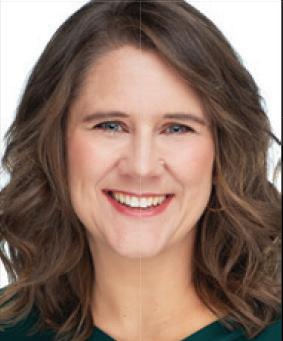

BY MARIA ALLARD allard@candgnews.com
METRO DETROIT — There is a large group of micro/mini car owners nationwide who meet occasionally to bond over the unique vehicles they own. They travel across state lines for activities geared toward quirky cars, funny stories and camaraderie.
Jim Golomb, of Northfield, Illinois, is one such car buff. He just organized the fourth annual Meet in the Middle Micro Car/Mini Car 2025. Micro/mini car owners from Ohio, Wisconsin, Georgia, Kentucky, New Mexico and more trailered their vintage vehicles and met up June 20-21 in Macomb County.
Marty and Marybeth Abramson, for instance, made the trip with their 1971 British Bond Bug all the way from Niagara Falls, New York. Jeff Lane, of Nashville, Tennessee, brought three mini cars along for the ride. Lane felt right at home with the other micro car fanatics: he owns the Lane Motor Museum in Nashville.
A microcar usually has three or four wheels with an engine smaller than 700 cubic centimeters. Types of microcars include bubble cars, cyclecars, Invacars, quadricycles and voiturettes.
Meet in the Middle was supposed to kick-start with an outdoor barbecue June 20 at Brandenburg Park in Chesterfield Township. However, because of unpredictable weather, the group brought the hot dogs and potato salad indoors to the Tru by Hilton Hotel in Chesterfield Township.
The June 21 agenda was to tour Stahls Auto Museum in Chesterfield Township, drive over to Selfridge Military Air Museum in Harrison Township, and have dinner at the Sugarbush Tavern in Chesterfield Township. The parade of cars also headed to Sanders Chocolate & Ice Cream Shoppe in Clinton Township Friday night.
“I’m glad to be here among friends. This is what

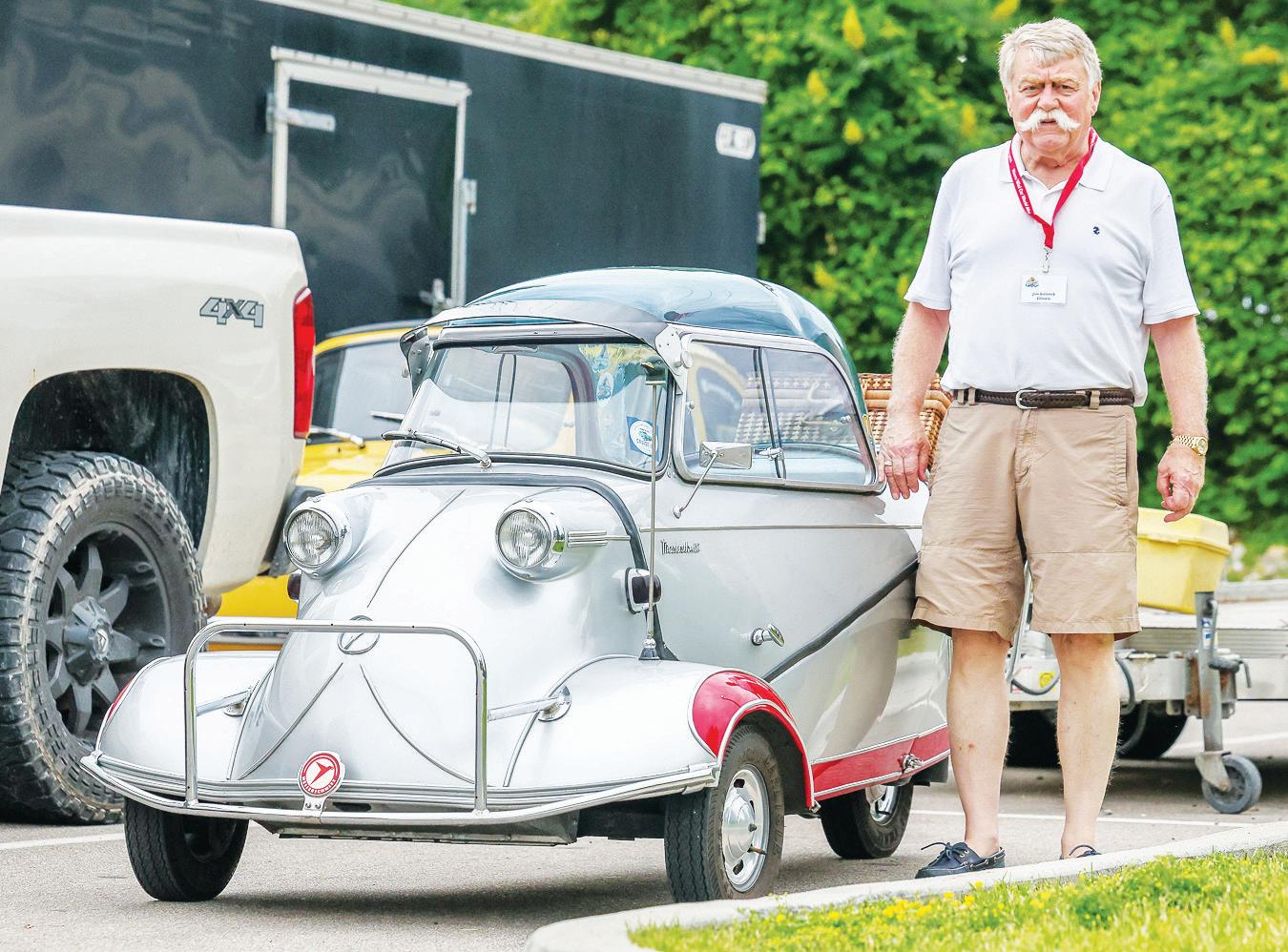
it’s all about,” Golomb, 75, said. “I grew up in Saginaw and my family worked for General Motors. Cars were my thing. I enjoyed them. I like unusual cars.”
Golomb can’t get enough of his 1955 Messerschmitt.
“It’s a two-seater. There’s a front and back seat. What I like most is sharing the cars with other people, letting kids see them and letting adults see them,” he said. “They’re fun. They’re unique. They’re different.”
Golomb also owns a 1957 BMW Isetta and a 1930 Rolls Royce Phantom One.
One reason for the Brandenburg Park barbecue was so that a small group of local Amphicar owners could make a splash in Lake St. Clair. That fell through, but International Amphicar Owners Club members still met up with the group at the hotel.
The Amphicar, designed by Hans Trippel, operates on land and water. According to the website rarehistoricalphotos.com, the Amphicar was manufactured in West Germany and first appeared in the U.S. at the 1961 New York Auto Show. The website
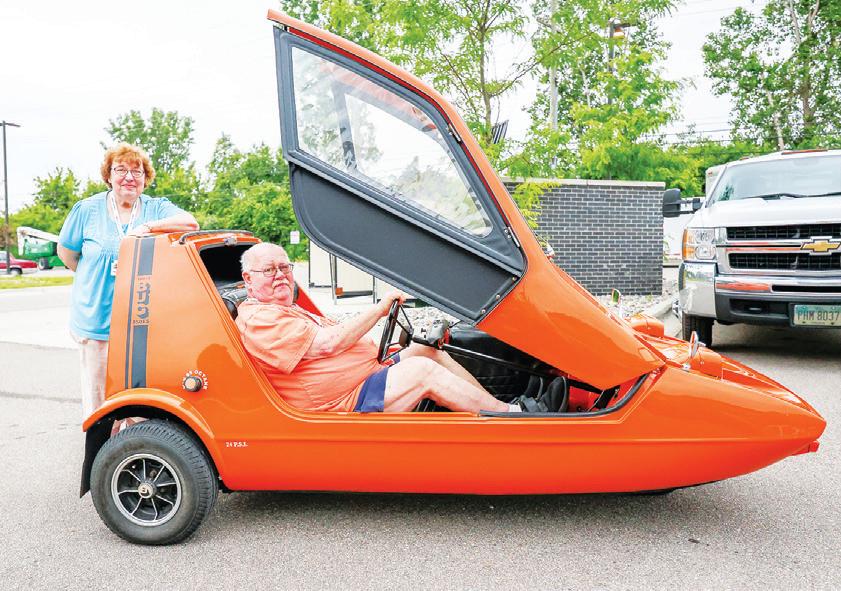
states the Amphicar’s engine was mounted at the rear of the vehicle, driving the rear wheels through a four-speed manual transmission. On the water, the same engine drives a pair of reversible propellers at the rear with a second gear lever engaging forward or reverse drive.
Fraser resident Chuck Reiner, 70, owns a 1968 blue Amphicar.
“It’s all my wife’s fault,” he joked. “She saw an Amphicar at the Woodward Dream Cruise.”
His wife, Deanna, thought it would be the ideal vehicle to take up north.
“I did end up finding one. I take it to a lot of car shows whenever possible and on Lake St. Clair. You can seat two people in the front and three people in the back,” Reiner said. “On water, it felt very unnatural at first. You’re driving your car into the water. After you’ve done it a couple times, it feels enjoyable. It takes forever to get up to speed. We go on all kinds of rivers, lakes, all See CARS on page 9A














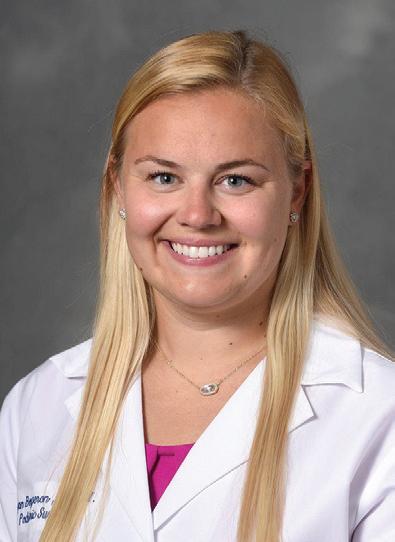

Southfield Mayor Kenson Siver said the city is committing to doing urban trails and getting more people walking in the city.
“Many times when you think of going hiking, you get in the car and you go to the woods someplace or a trail along a river, and instead we want people to walk in their own community,” he said.
According to Siver, Southfield received funding to do the trail from Evergreen Road to Greenfield Road, which will be done in 2026.
He also said there is focus to layer amenities all along the trail. This includes benches, trash receptacles, bike repair stations, dog respite stations, public art, birdhouses, mile markers and way-finding signage.
“These are not sidewalks,” Siver said of the trails. “These are 8-to-10-foot-wide pathways that are suitable for biking, rollerblading, certainly walking, jogging, and one of the reasons SEMCOG is doing this is they want people to get outside, to not always get in a car. … By fall of ’26, we will have 5 of our 6 miles across Nine Mile with a trail.”
In the press release, Siver stated that Southfield will be partnering with the neighboring communities of Farmington, Farmington Hills, Oak Park, Ferndale and Hazel Park for its Nine Mile Road Greenway Corridor project.
Ferndale Mayor Pro Tem Laura Mikulski said Nine Mile has evolved from more than just a road and is now a connector of communities.
“It is serving as a multimodal way for people to get from point A to point B and really enjoy the corridor,” she said. “Ferndale has always been a kind of a hub, like, around our Nine Mile area because we have a downtown there, but the effort to make it multimodal and expanding out across multiple cities, it’s really a regional effort to revitalize the entire corridor.”
The most important improvement Mikulski said that they as communities can make is to improve walkability.
“We see it in Ferndale and making the sidewalks safer for people. That extending out in Oak Park has been absolutely phenomenal with a greenway where people can walk and have pocket parks and things to do along the way,” she said. “I really think that was one of those transformational things, because it makes it nicer to go through to the different restaurants and retail stores along the Nine Mile corridor.”
Siver said that this is all about economic development and investing in Nine Mile.
“If you were to drive down Nine Mile from Evergreen over to Telegraph or beyond, you’d see the pathway and then you’d see — we’re not done — but we’ve been putting out benches, trash cans and way-finding signage,” he said. “Eventually, as money becomes available, we keep layering on things.”
from page 8A
over the place in different states.”
The Reiners trailer the car to Florida in the winter to meet other IAOC members for some water time.
“We have members throughout the country and throughout the world,” Reiner said.
Other IAOC members Tom Hurley, of Fair Haven, and Jeff McKeown, of Chesterfield Township, attended Meet in the Middle. McKeown has a 1964 Amphicar he takes out often with his significant other, Sandra Shenduk. McKeown morphed into owning the vehicle after his uncle sent him a photo in one.
“It’s just awesome. We get together in the summer and go to Lake St. Clair. We can travel in the shallow areas and by the bays and hang out with the boaters and go swimming,” McKeown said. “Little kids love it.”
“We get so many people stop what they’re doing and take a picture of the car,” Shenduk said.
Rumor has it that even singer Uncle Kracker once snapped a photo of them. Harsens Island in St. Clair County is a favorite spot for Shenduk, and McKeown has even medaled at the Algonac boat show. Not content with just owning one vintage model, McKeown also has a 1948 Crosley wagon.
Hurley said he purchased his 1964 red Amphicar from George Gray, an announcer from “The Price Is Right” who also hosted the “Weakest Link” game show.
Although the Amphicar “doesn’t go very fast, everyone loves it. Everyone is waving at you. Everyone is looking at you,” Hurley said. “I’ve swam out of it. The first time driving it was a little scary. We’ve been to Lake Michigan. We trailer them and go all over. Just putzing along, it’s relaxing to me.”


Be sure to check the boat’s blower, lights and horn, and make sure that everything is in working order. The sheriff suggests “more is better” when it comes to watercraft safety equipment. Bouchard also suggests having a hook or other lifesaving tools that could help someone in distress.
Operating the boat while sober and having the proper equipment ready is paramount.
“If those two boxes are checked in terms of prevention, more than likely you’ll never see a water accident,” Bouchard said.
His message was echoed by the Greater West Bloomfield Community Coalition with their campaign, “Alcohol and Water DON’T Mix.”
According to the coalition, 70% of water recreation deaths involve the use of alcohol. Consequences of mixing alcohol and water recreation include misjudging one’s swimming ability, slowed reaction time, numbed senses, reduced coordination and reduced effectiveness of CPR.
“(The coalition’s) mission is to build community partnerships to reduce high risk behaviors including alcohol, tobacco
from page 1A
city program. And yet, it provides a critical safety net for families and individuals facing food insecurity, especially in today’s difficult economy.”
Kathy Anderson, the pantry’s operations supervisor, explained that the more people contribute to the cause, the more the pantry can help others.
There was a time when the pantry even offered cleaning products and hygiene items, including feminine products, during the first distribution of each month. However, those have been limited lately due to lack of supply. When possible, the pantry still tries to provide limited amounts of baby diapers, wipes, and most sizes of adult diapers.
All donated items are checked for safety. Unexpired items are not accepted. Volunteers at the pantry carefully check the dates on each item, discarding the ones that may no longer be safe.
Boxed and canned food that hasn’t expired is always appreciated. Officials say that boxed side dishes, soups, cake mixes, cereals, tuna fish, cooking oil and canned diced
and other drug use, to help ensure that our youth may grow to their greatest potential,” said Lisa Berkey, executive director.
The sheriff also recommends assigning a designated observer when swimming.
“We have seen incidents where children have drowned surrounded by adults at a party, because one person is not tasked with watching that child at all times,” Bouchard said. “No one noticed they quickly slipped under the water and were at the bottom of the pool and drowned.”
Having an observer is important even for adult swimmers who are strong and athletic.
“In one tragic case, a young man who was a very strong swimmer — very athletic — was swimming to train to get into … peak physical condition. The day before, he swam across the lake and back without a problem,” Bouchard said. “But the next day when he went out to do the same thing, (and) he didn’t complete the swim and drowned.”
The swimmer may have gotten cramps, Bouchard said, but it’s unknown what happened.
“Don’t be misled by the fact (that) if you are a strong swimmer or if someone is a strong swimmer, that you don’t need safety equipment or safety observation of that swimmer, because you don’t know what’s going to happen,” Bouchard said.
tomatoes are especially appreciated, as are donations of shampoo, toothpaste and other toiletry items, as well as maxi pads and tampons, and even cleaning products such as bleach, dish soap, dishwasher pods and laundry pods. Pet food is also appreciated.
Nonperishable items can be placed at several drop-off sites around town, including a bin at the top of the east entrance ramp at Central Church; inside the building at Pharmacy Shop, located at 28411 Dequindre Road; at St. Patrick’s Episcopal Church, 1434 E. 13 Mile Road; and in the south entrance vestibule at City Hall, 300 W. 13 Mile Road, during business hours.
Monetary donations should be sent to Madison Heights Food Pantry, P.O. Box 71202, Madison Heights, MI 48071. Another way to provide financial support is to buy the “Simply Give” cards at the Meijer store at 1005 E. 13 Mile Road in Madison Heights. Each card is a $10 donation to the pantry, matched by Meijer, and the pantry receives gifts cards to buy food and other supplies. The pantry also has an Amazon wish list.
Volunteers are also needed to help with inventory, retrieving items, directing traffic on distribution days and more. To see how you can help, email hello@madisonheights foodpantry.org.






























